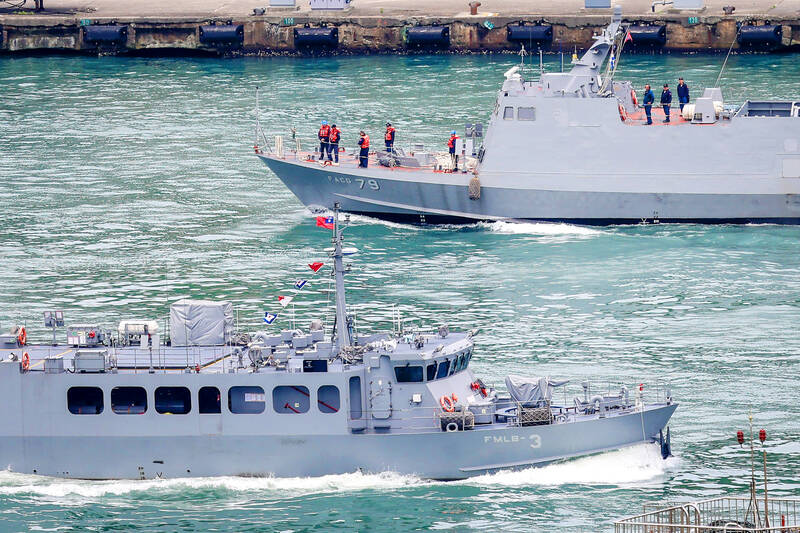China on Tuesday launched its latest round of war games around Taiwan, which Beijing yesterday said were a “stern warning” against separatism.
The Chinese military last night said it had concluded the two days of drills, codenamed “Strait Thunder-2025A.”
The People’s Republic of China has claimed Taiwan through its “one China” principle since the Chinese Civil War forced the defeated Republic of China government to flee to Taiwan in 1949, and has vowed to bring Taiwan under Beijing’s rule, by force if necessary.

Photo: Ritchie B. Tongo, EPA-EFE
Taiwan strongly rejects Beijing’s claims, saying it is already an independent country called the Republic of China, and that only its people can decide its future.
The latest exercises follow a long history of conflict between Taiwan and China.
Taiwan and China have nearly gone to war several times since 1949. The two sides last joined battle on a large scale in 1958, when Chinese forces bombed the Kinmen and Matsu islands for more than a month, alongside naval and air combat.
Ahead of Taiwan’s first direct presidential election in 1996, China carried out missile tests in waters close to the nation, hoping to prevent people voting for former president Lee Teng-hui (李登輝), whom China suspected of harboring pro-independence views. Lee won convincingly.
In August 2022, furious at a visit to Taipei by then-US House of Representatives speaker Nancy Pelosi, China held several days of war games around Taiwan, including launches of ballistic missiles, some of which flew over Taipei, and simulated sea and air attacks in surrounding skies and waters.
In April 2023, China held three days of drills around Taiwan, saying they had tested integrated military capabilities under combat conditions, having practiced precision strikes and blockading the nation. The drills came after then-president Tsai Ing-wen (蔡英文) returned to Taipei following a meeting in Los Angeles with then-US House speaker Kevin McCarthy.
In August 2023, China launched military drills around Taiwan as a “serious warning” to “separatists” in an angry, but widely expected, response to then-vice president William Lai’s (賴清德) visit to the US.
In May last year, shortly after Lai’s inauguration as president, China launched “punishment” drills dubbed “Joint Sword-2024A” around Taiwan in what it said was a response to “separatist acts,” sending up heavily armed warplanes and staging mock attacks.
In October last year, China held one day of war games called “Joint Sword-2024B” around Taiwan in response to a national day speech by Lai. Taiwan said China used a record number of military aircraft in the exercises.
In December last year, Taiwan reported a large rise in Chinese air force and navy activity around the nation and in waters in the region, although China never officially confirmed it was holding exercises.

The manufacture of the remaining 28 M1A2T Abrams tanks Taiwan purchased from the US has recently been completed, and they are expected to be delivered within the next one to two months, a source said yesterday. The Ministry of National Defense is arranging cargo ships to transport the tanks to Taiwan as soon as possible, said the source, who is familiar with the matter. The estimated arrival time ranges from late this month to early next month, the source said. The 28 Abrams tanks make up the third and final batch of a total of 108 tanks, valued at about NT$40.5 billion

A group from the Taiwanese Designers in Australia association yesterday represented Taiwan at the Midsumma Pride March in Melbourne. The march, held in the St. Kilda suburb, is the city’s largest LGBTQIA+ parade and the flagship event of the annual Midsumma Festival. It attracted more than 45,000 spectators who supported the 400 groups and 10,000 marchers that participated this year, the association said. Taiwanese Designers said they organized a team to march for Taiwan this year, joining politicians, government agencies, professionals and community organizations in showing support for LGBTQIA+ people and diverse communities. As the first country in Asia to legalize same-sex

Travel agencies in Taiwan are working to secure alternative flights for travelers bound for New Zealand for the Lunar New Year holiday, as Air New Zealand workers are set to strike next week. The airline said that it has confirmed that the planned industrial action by its international wide-body cabin crew would go ahead on Thursday and Friday next week. While the Auckland-based carrier pledged to take reasonable measures to mitigate the impact of the workers’ strike, an Air New Zealand flight arriving at Taipei from Auckland on Thursday and another flight departing from Taipei for Auckland on Saturday would have to

MOTIVES QUESTIONED The PLA considers Xi’s policies toward Taiwan to be driven by personal considerations rather than military assessment, the Epoch Times reports Chinese President Xi Jinping’s (習近平) latest purge of the Chinese People’s Liberation Army (PLA) leadership might have been prompted by the military’s opposition to plans of invading Taiwan, the Epoch Times said. The Chinese military opposes waging war against Taiwan by a large consensus, putting it at odds with Xi’s vision, the Falun Gong-affiliated daily said in a report on Thursday, citing anonymous sources with insight into the PLA’s inner workings. The opposition is not the opinion of a few generals, but a widely shared view among the PLA cadre, the Epoch Times cited them as saying. “Chinese forces know full well that